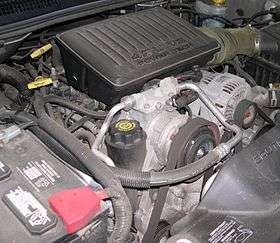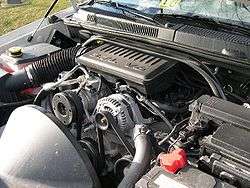Chrysler PowerTech engine
The PowerTech V6 and V8 engine family was designed in 1998 by Chrysler. This was also the first new V8 engine for Chrysler since the 1960s, although the initial design development for them was done by American Motors Corporation (AMC).[2] The companion V6 was basically the V8 with two fewer cylinders, another concept that originated at AMC before the company joined Chrysler.[3] These new engines had nothing in common with the Chrysler A engine V8s, nor the Jeep 4.0 L "PowerTech" I6 engine.
 | |
| Overview | |
| Manufacturer |
|
| Also called | Next Generation Magnum |
| Production | 1999-April 9, 2013[1] |
| Layout | |
| Configuration | Naturally aspirated 90° V6/V8 |
| Displacement | 3.7–4.7 L; 225.8–286.7 cu in (3,701–4,698 cc) |
| Cylinder bore | 3.66 in (93 mm) |
| Piston stroke | 3.405 in (86.5 mm) 3.57 in (90.7 mm) |
| Block material | Cast iron |
| Head material | Aluminum |
| Valvetrain | Single overhead camshaft |
| Compression ratio | 9.8:1 |
| Combustion | |
| Fuel system | Sequential MPFI |
| Fuel type | Gasoline, E85 |
| Oil system | Wet sump |
| Cooling system | Water-cooled |
| Output | |
| Power output | 210–310 hp (157–231 kW) |
| Torque output | 235–334 lb⋅ft (319–453 N⋅m) |
| Chronology | |
| Predecessor |
|
| Successor |
|
A 4.7 L V8 came first, fitted in the Jeep Grand Cherokee, and a 3.7 L V6 version debuted in 2002 for the Jeep Liberty. The PowerTech V6 and V8 were direct replacements for Chrysler's LA family in the early 2000s, and were also used in the Dodge Ram and started in the 2000 Dodge Durango. They were not used in any cars, but were reserved for truck and SUV use. They are also known as Next Generation Magnum in Dodge applications.
The PowerTech V6 and V8 engines were produced at the Mack Avenue Engine Complex in Detroit, Michigan. E85 compatible versions of some PowerTech engines were developed and used in numerous Chrysler vehicles. On April 9, 2013, the last 4.7 L engine was built; ending 15 years of production with over 3 million units built.[1]
4.7
The 4.7-liter version was the first of this family, appearing in the 1999 Jeep Grand Cherokee. The displacement is 4.7 L; 286.7 cu in (4,698 cc) with a bore and a stroke of 3.66 in × 3.405 in (93.0 mm × 86.5 mm). It has a cast iron block and aluminum heads with two valves per cylinder. It uses chain-driven Single overhead camshafts, one in each head. It originally produced 235 hp (175 kW) and 295 lb⋅ft (400 N⋅m) of torque. The 4.7 L V8 is available with four speed and five speed automatic transmissions and a 5 speed manual transmission.
The PowerTech was on the Ward's 10 Best Engines list for 1999.
- 1999–2009 Jeep Grand Cherokee
- 2000–2007 Dodge Dakota
- 2000–2009 Dodge Durango
- 2002–2007 Dodge Ram 1500
- 2006–2009 Jeep Commander
- 2007–2009 Chrysler Aspen
- 2006–2007 Mitsubishi Raider
4.7 HO
A "High-Output" version of the 4.7 L PowerTech engine, producing 265 hp (198 kW) and 330 lb⋅ft (447 N⋅m) of torque, was introduced in 2002, first appearing in the Jeep Grand Cherokee Limited as an option and in the Jeep Grand Cherokee Overland as standard equipment.
This engine was discontinued after the 2008 model year, though the non high output 4.7L V8 engine continued to be available in all vehicles.

Applications:
- 2002–2004 Jeep Grand Cherokee
- 2007–2008 Jeep Grand Cherokee
- 2007–2008 Dodge Dakota
- 2007–2008 Dodge Ram 1500/Ram 1500
2008 Revisions
The 2008 Dodge Dakota and Ram pickup trucks, Dodge Durango and Chrysler Aspen SUV's, Jeep Grand Cherokee, and Jeep Commander came with a Corsair version of the FFV 4.7 L engine, with dual spark plugs per cylinder, a new slant / squish combustion system design, and 9.8:1 compression, raising power to 290–310 hp (216–231 kW) and 320–334 lb⋅ft (434–453 N⋅m) of torque. The 2008 4.7 also features other upgrades including a more aggressive camshaft profile, a 74 mm (2.91 in) throttle body, and an improved intake manifold with shorter runners. See Allpar's page on the latest 4.7 L.
3.7 EKG

The EKG is a 3.7 L V6 version built in Detroit, Michigan. It displaces 3.7 L; 225.8 cu in (3,701 cc).[4] The bore and stroke is 3.66 in × 3.57 in (93.0 mm × 90.7 mm). It is a 90° V engine like the V8, with SOHC 2-valve heads. It utilizes a counter-rotating balance shaft mounted between the cylinder banks to deal with vibration problems of the 90-degree V6 design, as well as use a 30-degree split pin crankshaft to fire the cylinders every 120 degrees. Output is 210 hp (157 kW) at 5200 rpm with 235 lb⋅ft (319 N⋅m) of torque at 4000 rpm.[4] It has a cast iron engine block and aluminum SOHC cylinder heads. It uses Sequential fuel injection, has roller followers, and features fracture-split forged powder metal connecting rods and an assembled reinforced plastic intake manifold.
- 2002–2010 Dodge Ram 1500
- 2011-2012 Ram 1500
- 2004–2011 Dodge Dakota
- 2004–2009 Dodge Durango
- 2007–2011 Dodge Nitro
- 2002–2013 Jeep Liberty/Cherokee
- 2005–2010 Jeep Grand Cherokee
- 2006–2010 Jeep Commander
- 2006–2010 Mitsubishi Raider
- 2002 Dodge M80
References
- Gates, Max; Kalinowski, Jeff (9 April 2013). "Mack Avenue Builds Final 4.7; Looks Forward to Pentastar". Chrysler Blog. Archived from the original on 3 December 2013. Retrieved 26 March 2018.
- Ehrenberg, Rick. "Next generation V8 engine - the Dodge/Jeep 4.7 liter V-8". allpar.com. Retrieved 26 March 2018.
- "Allpar presents the Dodge/Jeep 3.7 liter V-6". allpar.com. Retrieved 26 March 2018.
- "Jeep - Specs & Upgrades". Chrysler LLC. Retrieved 2008-01-14.
Engine - Displacement - Cubic Inches...226.0. Engine - Displacement - Cubic Centimeters...3701; bore (in.)...3.66; stroke (in.)...3.57
External links
| Wikimedia Commons has media related to Chrysler PowerTech engine. |